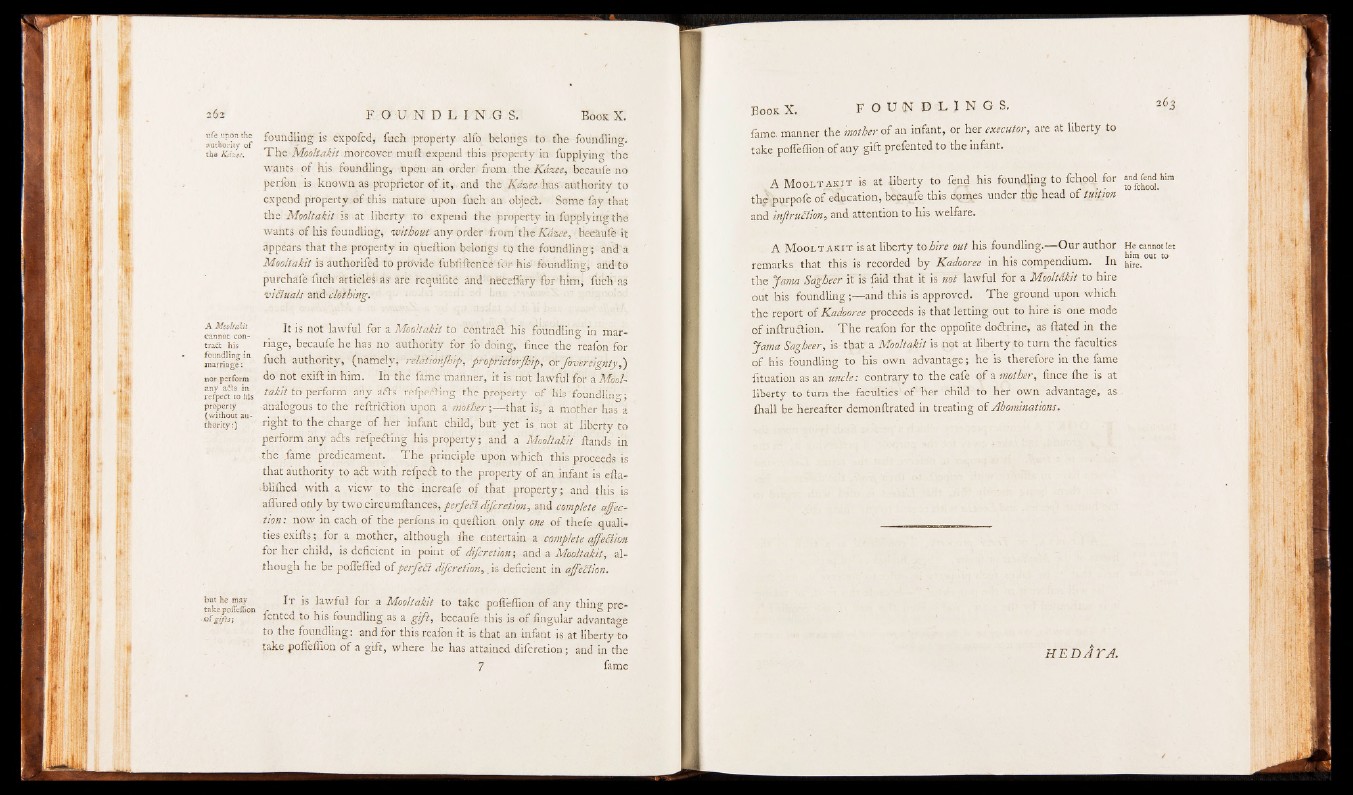
ufe,upon the
authority of
the Kdzee.
A Mooltakit
cannot con-
traft his
foundling in
marriage:
nor perform
any afts in
refpefl to his
property
(without authority:)
but he may
take pofleflion
rfgftsi
foundling is éxpofed, fuch property alfo. belongs to the foundling.
The Mooltakit moreover muft expend this property in fupplying the
wants. o f his foundling, upon an order from the Kdzee., becaufe no
perfon is known as proprietor o f it, and the Kdzee hag; authority to
expend property of this nature upon inch an objedt. Some fay that
the Mooltakit is at liberty to expend the property in fupplying the
wants of his foundling, without any order from thé Kazee, becaufe it
appears that the property in queftion belongs tq the foundling'; and a
Mooltakit is authoriled to provide fubfiftencé’for- his' foundling; arid to
pürchafe fuch articles- as1 are requisite and nbfceflary for him, fuch as
victuals and clothing. \ \
It is not lawful for a Mooltakit to cóntrda his foundling in marriage,
becaufe he has no authority for fo doing, fmee the reafon for
fuch authority, (namely;; reldtionfhip, pfhptieiorjhip, oyfov'ereighty,)
do not exift in him. In the fame manner, it is not lawful for a Mooltakit
to perform any adts refpedting the property of his foundlino- •
analogous to the reftridtioii upon a mother;— that is, a mother has a
right to the charge of her infant child, but yet is .not at liberty to
perform any adts. refpedting his. property; and a Mooltakit hands in
the fame predicament. The principle upon which this proceeds is
that authority to a.dt with refpedt to the property of an. infant is efta-
iblilhed with a view to the increafe of that property; and this is
affured only by two circumftances, perfeEl diferetion, and complete affection:
now in each of the perfons. in queftion only one of thefe qualities
exifls; for a mother, although fhe entertain a complete affeBion
for her child, is deficient in point of diferetion; and a Mooltakit, although
he be poflèflèd ofperfeB diferetion, .is deficient in affeBion.
I t is lawful for a Mooltakit to take pofleflion of any thing pre-
fented to his foundling as a g ift, becaufe this is of Angular advantage
to the foundling: and for this reafon it is that an infant is at liberty to
take pofleflion of a gift, where he has attained diferetion; and in the
7 fame
fame, manner the mother of an infant, or her executor, are at liberty to
take pofleflion of any gift prefented to the infant.
A Mooltakit is at liberty to fend his foundling to fchool for
thp j^rpofe of education, becaufe this cpr^es under the head of tuition
and inflruBion, and attention to his welfare.
A Mooltakit is at liberty to hire out his foundling.— Our author
remarks that this is recorded by Kadooree in his compendium. In
the Jama Sagheer it is faid that it is not lawful for a Mooltakit to hire
out his foundling;— and this is approved. The ground upon which
the report of Kadooree proceeds is that letting out to hire is one mode
of inftruaion. The reafon for. the oppofite doarine, as ftated in the
Jama Sagheer, is that a Mooltakit is not at diberty to turn the faculties
of. his foundling to his own advantage; he is therefore in the fame
fituation as an uncle: contrary to. the cafe of a mother, fince (he is at
liberty to turn the faculties of her child to her own advantage, as.,
lhall be hereafter demonftrated in treating of Abominations.
and fend him
to fchool.
He cannot let
him out to
hire.
H E 'D A Y A .